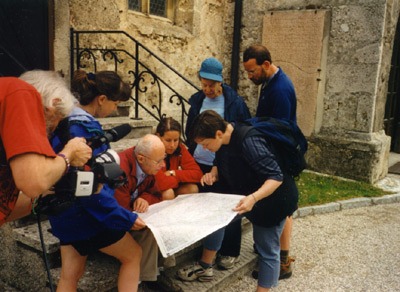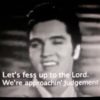
Journey into the Past
Written by Simon Rucker | Posted by: Anonymous
One of the many highlights of the 2002 Boston Jewish Film Festival is the world premiere of filmmaker and cinematographer Austin de Besche’s "Pilgrimage into the Past." In the summer of 2000, de Besche accompanied Holocaust survivor Michael Kraus and his family on a three-day trek through the Austrian countryside. As a boy Kraus and thousands of other prisoners were forced on a "death march" in the waning days of the war, and for a long time Kraus had wanted to walk the route once more.
Ostensibly this is exactly what the digital video film is about, but it is in fact a much richer and more immediate journey. "Pilgrimage into the Past" is less about the horrors Kraus and so very many others suffered during the Holocaust, and more about how he has survived being a Holocaust survivor. It is a film less about things from a terrible past that Kraus himself says he remembers "like trying to remember what it was like being hungry five years ago," and more about the difficulties of a family trying to come to terms with the legacy in the present.
SR: Where did you get the idea for the film? I know you met Michael Kraus while filming a documentary.
de Besche: I was working as a cameraman on a film called "Voices of the Children," shot in about 1995. It was a documentary about survivors who had been children in the concentration camps and had kept diaries. I was cameraman for the part of the film about [Michael Kraus] and he lives close by. We got to be friends and stayed in touch. I was having lunch with him one day and he mentioned that he wanted to try to go back and walk the route of this death march with his family. It didn’t take me long to decide that it might be an interesting thing to go along on, and I knew it was a project I could photograph without spending too much money in the mini-DV format. I asked if my wife and the soundman could come along, and the family thought about it for a bit and ended up saying yes.
SR: It was your proposal to make a film of the trip?
de Besche: It was, yes.
SR: What were filming conditions like? It seems like you were walking backwards a lot to film the participants as they walked and talked, and you yourself are not in the film at all. What was it like for you, your wife and the soundman?
de Besche: The first part — my wife acted as water/battery carrier, and the poor soundman was carrying his mixer and a ton of submixers and receivers for these wireless mics. The four family members plus one daughter’s husband had wireless mics on them, so the soundman was much more weighted down than I was. We just walked along. I definitely hadn’t thought enough beforehand about how we would be walking most of the time. I had pictured us walking some and stopping somewhere and sitting and talking, and I could do my filming as the family was sitting and talking. It didn’t work that way, we were walking most of the time, so I had to figure out ways to be walking along with people while talking to them. I was either walking beside someone or walking backwards in front of them, but I couldn’t walk fast enough in front.
SR: What was it like being there with the family?
de Besche: That’s the very complicated question — one of them. There’s a lot to that. They never got entirely over the fact that there was someone with a camera pointed at them. I was a friend, I knew all of them some before that and it certainly made it easier. They did want the filming to happen even if it sometimes made them uncomfortable. Filming made them uncomfortable but also made them think and talk about these issues more than they otherwise might have. It was a double-edged sword in that way. I’m not a person who feels great about intruding in people’s lives but I was very interested in the story and very fond of the people, so I tried not to pry with the camera. I didn’t shoot once we were finished walking in the evenings and at dinnertime. I just shot as we were walking along and tried to engage everyone in conversations and talk to them about the issues I thought were hanging in the air. I certainly felt awkward at times but those four people were as comfortable as they could possibly be in front of a camera with myself and the crew. But, as you can see from the film, they are a pretty private group of people and that makes it a tough subject for a film.
SR: Not only that, but the camera itself affects the people in the film.
de Besche: It always affects things and you can’t always predict how it does affect people. In the long run it might have been a good thing that I was there because they thought and talked about these things that they hadn’t talked about for all these years, and that was part of the issue for the daughters. I hope that comes across in the film.
SR: I think it comes across very strongly in the film.
de Besche: They discovered something during this walk about other members of the family. It certainly wasn’t about learning how to deal with the Holocaust overall (nobody can), but they did learn something about being a family together. I hope those kinds of things come across in the film and I’m very consciously trying to not make this show-and-tell, there’s no narrator. I just let the audience watch and see what happened, and see that people’s thoughts have changed even after only three days, even more after the walk.
Everybody did end up looking comfortable and they were in their own way. But I definitely initiated conversation. I could see after the first couple hours that we were just going to walk along unless I started talking to people, so I just made conversation. There’s about 26 hours of footage from those three days. That’s what those 26 hours consist of, with occasional sit-down conversations.
SR: How did you feel about having to film this, and engage the family, on what is in a way their journey?
de Besche: I did feel embarrassed once in awhile, particularly at the end of the journey. This was partly because I was there, partly because they all wanted different things to happen and nothing was happening, just as nothing happened for the people who arrived there 55 years before. I felt awkward there — I was the one who cried, none of the family did — but I wanted to make a record of this and I was torn. Any story of the Holocaust is important to tell and I thought that making our conversations a continuation of something that worked from what one of the family had been talking about. When Michael talks about not remembering much I talk with him and his wife about memory.
SR: It doesn’t seem like you had to do anything like that in the film. It seems to come naturally from the family.
de Besche: I’m proud that I managed to chat along with people instead of just making it a formal interview with a list of questions. That was my approach, to make it as conversational as possible and let their real answers come out.
SR: How do Michael and the other family members feel about the finished film?
de Besche: Michael and Illana really like it, I believe. Everyone is a little embarrassed about some part of it, which is going to happen when someone lets a camera crew follow them around. People said things then that they wouldn’t necessarily say now, and people say things about other people that those people don’t want to hear. There’s a part in the film where Michael’s daughters talk about how he can be occasionally be a fussy, cranky person. Is he happy to have that in the film? No, but he knows it’s part of the story and he’s been very trusting with me, and I’m grateful to all the family that they let these things stay in that they felt a little funny about. They had veto power and they let things stay in.
SR: How do the daughters feel?
de Besche: I haven’t had as much time to talk with Dana and Tamara about how they like it. They approved it but at first I think for Dana — for all of them, it was more about the family than they previously thought. That took them back a little bit at first but Michael and Illana feel it’s quite good, though I’m not sure of Dana and Tamara’s reactions at this moment. I was surprised at how much it was about the family.
SR: I think that’s the strongest feature of the film.
de Besche: They’re trying how to deal with this within their family. Not so much historically, what to do with the Holocaust, but how to ease some of the strain within the family and for all sides to see how other sides felt about it. I was surprised, I thought it would be mostly about the Holocaust — a return journey — and I knew that the daughters hadn’t been told much about it and wanted to know more. That came up but it was about the family working these things out together, and that was the journey just as much as the physical one was. I wanted to keep in those four lives over those three days, that’s why there’s no archival footage and no narrator to tell the audience what they should think.
As part of the 14th Annual Boston Jewish Film Festival, 'Pilgrimage into the Past' has its world premiere on Thursday, November 14th, 5:30pm, at the Coolidge Corner Theatre. The festival runs from November 7-17th at Coolidge and the Museum of Fine Arts. For information and tickets: 617-244-9899 or info@bjff.org. Website www.bjff.org









